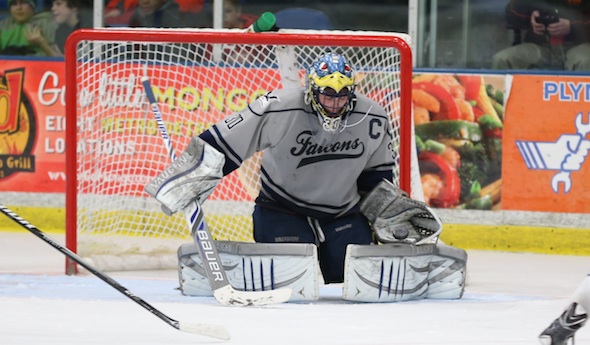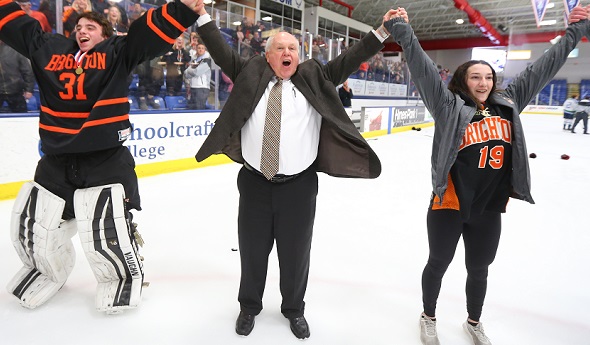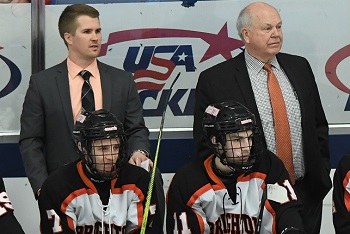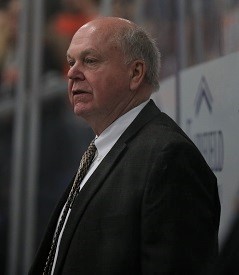
Farmington Finishes Fantastic Run as #1
March 8, 2014
By Geoff Kimmerly
Second Half editor
PLYMOUTH – Goaltender John Lethemon was right on all week for the Farmington hockey team.
In net, he was nearly unbeatable. And after the Falcons finished an unpredictable run Saturday with a 2-1 win over Sault Ste. Marie and their first MHSAA title, he said what everyone else was thinking.
“I don’t really think anybody in Michigan besides these 19 guys, our four coaches, the trainers and obviously our parents believed we could do this,” Lethemon said. “We knew all along that if we caught fire at the right time, some bounces would go our way … and we all just busted our butts the whole six games."
Well said.
It was tough a week ago to see the Division 3 tournament unfolding the way it did over the last five days, with reigning champion Bloomfield Hills Cranbrook-Kingswood considered the best by many in any division and a likely champ if the Cranes somehow were to stumble.
That was before Lethemon made 60 saves in a 3-2 win over Cranbrook-Kingswood in the Quarterfinal, 21 more in a 2-1 win over Grand Rapids Catholic Central on Friday and a final 29 as the Falcons dispatched of the Blue Devils – and then accepted his championship medal to student section chants of “M.V.P.”
But the Falcons felt the impact of a number of contributors this week.
In front of Lethemon were a strong group of defensemen including seniors Austin Meltzer, Grant Newton and Roman Firestone, who all likely played close to 40 minutes during the Final. Keying the offense was sophomore Jason Petras, who scored once in the Semifinal and both goals in the championship game.
And keying Petras, in part, was his guardian angel.
Jason’s mom Kim Petras, also a teacher in the Farmington district, died Feb. 4 after a fight against colon cancer. He played for the Falcons that night, and with his teammates has since rallied to her memory.
Farmington coach Bill Newton – himself currently battling the same form of cancer – called Petras “a warrior and the catalyst of this hockey team from that point.”
“My mom was watching down, definitely helping me,” Petras said. “I knew she was with me through thick and thin. She’s my number one fan, and I knew she had a lot to do with how I played the last couple of games; that’s for sure.”
Farmington had scored first in all of its first five postseason games, and Petras giving the Falcons the lead again just 38 seconds in provided another jolt of confidence to go along with their teammate defending between the pipes.
Petras added his second goal at 13:17 of the first period.
 Blue Devils senior Blake Mastaw got his team on the board 18 seconds into the second period. But Lethemon and his crew of blueliners took care of the next 36 minutes and change.
Blue Devils senior Blake Mastaw got his team on the board 18 seconds into the second period. But Lethemon and his crew of blueliners took care of the next 36 minutes and change.
“We thought if we could play with a first-goal lead, that might take them out of their comfort zone and leave their goaltender hanging out on odd-man rushes,” Sault Ste. Marie coach John Ferroni said. “But they got the first goal, and we had to play a different style.
“They always thought, hey, we could steal this game. A 2-1 game is just one good shot on goal and you’re back tied again.”
Sault Ste. Marie finished 25-3-2 and runner-up for the seventh time as it pursued its first MHSAA hockey title since 1989.
Farmington ended 21-10, giving Newton a championship in his first season as head coach after a decade as an assistant. Brother to Michigan State University assistant coach Tom Newton, Bill quoted Tom in describing how a coach never sits too far away on the bus from his goalie – and how he was careful to not let Lethemon too far out of his sight.
Nor did his teammates as they piled onto him moments after finishing their run.
“You can’t call me M.V.P. These guys played great the whole time,” Lethemon said. “I just made the saves I had to make.”
PHOTO: (Top) Farmington goaltender John Lethemon makes one of his 29 saves Saturday in the Division 3 Final. (Middle) Sault Ste. Marie players bump gloves, led by senior Benjamine LaCross. (Middle photo by Andrew Knapik/Southgate.)

Brighton Coach's Impact 'Immeasurable'
By
Tim Robinson
Special for MHSAA.com
October 7, 2020
By Tim Robinson
Special for Second Half
Paul Moggach has never been much for looking back.
 And as he begins his first season away from the Brighton hockey program in more than three decades, he’s still looking ahead.
And as he begins his first season away from the Brighton hockey program in more than three decades, he’s still looking ahead.
“I’m thinking about what I’m going to miss more than the mark I left,” he said in a phone conversation last week. “I guess I enjoyed so much of the time I had, the opportunity to coach at Brighton, I’m thinking more how I fill the time and the things I'll miss.”
Moggach (pronounced MUG-uth) retired as Brighton’s coach this past summer after 25 seasons and having led five teams to MHSAA Division 1 championships. He compiled a record of 466-172-47 during that period.
But that’s not what he remembers most, nor why he wants people to remember him.
“I would like them to remember the teams and players who played for me and my assistants, more than me,” Moggach said. “We have so many blessings and opportunities in our lives, and hockey was one for me and hopefully for the players and assistants I worked with.”
One of those assistants was Kurt Kivisto, who joined the Bulldogs originally as a team manager more than 20 years ago and was a player at Brighton. He eventually won a national championship at Michigan State before rejoining the program as an assistant coach a decade ago.
“The No. 1 thing I’ll take from him is sticking by your beliefs and not sacrificing those beliefs for the team,” said Kivisto, who was named Moggach’s successor in September. “He sticks by those beliefs and ... he’s not willing to sacrifice that even if it could hurt the team. The character and integrity he has, how he treats people with fairness and what he believes is right is the biggest thing I’ll take.”
A stepson, Damon Whitten, played for Moggach at Brighton and at MSU before becoming an assistant coach and eventually the head coach at Lake Superior State, where he is in his eighth season.
Asked about Moggach’s impact at Brighton, Whitten said, “I’m not sure you can measure it. Your mind goes to the hockey players who have come to Brighton, and that’s a big part. But I think it goes beyond that. The money they’ve raised over the years for different families in need, for example. He’s had a big impact, and the players he had were a big part of that, but it goes well beyond that, and he did it the right way. Thirty-plus years (in the program), and I’m not sure you can count more than a handful of times where he made a bad decision or handled things poorly. He did things the right way, every day, all of the time, and I think it’s why he was so successful for so long.”
 The team’s charitable works were mostly kept under the radar – Moggach’s reasoning being his players had been given much, it was their turn to give back, and he didn’t want people thinking they did those things for publicity.
The team’s charitable works were mostly kept under the radar – Moggach’s reasoning being his players had been given much, it was their turn to give back, and he didn’t want people thinking they did those things for publicity.
Moggach joined Rick Bourbonais as an assistant at Brighton in the mid-1980s, then switched roles with him for the 1996-97 season.
He realized Brighton’s potential in the 1992-93 season, when the Bulldogs upset perennial state power Trenton in the Class A Quarterfinals before losing to Detroit Catholic Central in a Semifinal.
“That, to me, said, at least in my mind, that we can do this,” Moggach said. “It’s not impossible.”
He slowly began to build the program, getting good players and a schedule that would challenge them.
“You get the players by building a good culture,” he said. “Back in the day, when I started, we weren’t very disciplined and our league wasn’t very disciplined. So I think we realized we had to build that, and I could have an influence on building that in Brighton.”
Along with the culture, Moggach looked for an edge whenever he could find it. He was talked into making a trip to the Keweenaw Peninsula by one of his player’s parents, and found enormous benefits for his team, both competitively and in team bonding.
“It’s a lot about the little things we do,” he said, “that we find joy in, and create those opportunities. Creating the little moments really can build to bigger moments. We played capture the flag one day in about two feet of snow.
“Almost killed them,” he added, chuckling. The exhausted players didn’t have much left for the game that night, but spending time together for four days in a bus and hotel room always brought the team closer on and off the ice.
That first UP expedition also led to more teams making the trip, for team bonding and a glimpse of a part of the state, and themselves, they might never have seen otherwise.
“We didn’t do that for long,” he said. “But we always came back saying we were better together because of that experience.”
Bob Nelson had three sons play for Moggach, and Nelson’s wife, Kris, was president of the team’s booster club during their involvement over nearly a decade in Brighton hockey. Nelson also coached the program’s younger players for five seasons.
“We got to know the Moggachs really well,” he said. “It was a good experience, both as a coach and as a parent as well.”
Moggach introduced other things, including an emphasis on nutrition and off-ice training, that players resisted at first until they saw the benefits.
 He savored conversations with referees and opposing coaches before the games and even the occasional reporter after games.
He savored conversations with referees and opposing coaches before the games and even the occasional reporter after games.
But his first priority was the players. At times he would erupt in practice at a player or, more commonly, the team, and the boys soon learned to hear the message, not the volume. But for a couple of seasons, they also wrote some of his wilder statements down in a notebook after practice.
One year, they read some of them at the banquet, and after each one, Moggach’s wife, Sharon, would look at him and ask, “Did you really say that?”
Moggach would laugh and confess to remembering he had actually done so, then laughing.
“He knew part of what made the program good was his relationship to the players,” Nelson said. “If it was a good time, he wanted to enjoy it, even at his own expense at times.”
Moggach has staying in the background this offseason, letting Kivisto shape the team.
Asked if he were willing to fully switch coaching roles, as he and Bourbonais did a quarter-century ago, Moggach laughed.
“No,” he said emphatically. “Rick wasn’t in his 70s when we made the switch. Kurt needs his time. I’ll be there if he needs me.”
Moggach, who is 74, still works fulltime as the University of Michigan’s director of risk management.
He plans to spend more time with his wife and watch his grandsons play hockey, as well as catching some Lake Superior State games.
“I was really blessed to have Rick and Brownie (longtime assistant Mike Brown) along for the ride, and then to get Kurt involved,” Moggach said. “They weren’t the only ones, but they were the kids for me.
“The other thing is the support from the Brighton (High School) administration, the teachers, and our community. There are more people to thank than I could ever bring up. I do think that, all together, it was a great run. It couldn’t have been any better.”
PHOTOS: (Top) Recently-retired Brighton hockey coach Paul Moggach celebrates the 2018 Division 1 championship game win over Saginaw Heritage at USA Hockey Arena. (Middle) Former player Kurt Kivisto, left of Moggach during the 2018 Semifinal win over Detroit Catholic Central, served as an assistant before assuming the head coaching job in September. (Below) Brighton's 2018 championship was its fifth under Moggach. (Photos by Hockey Weekly Action Photos.)

